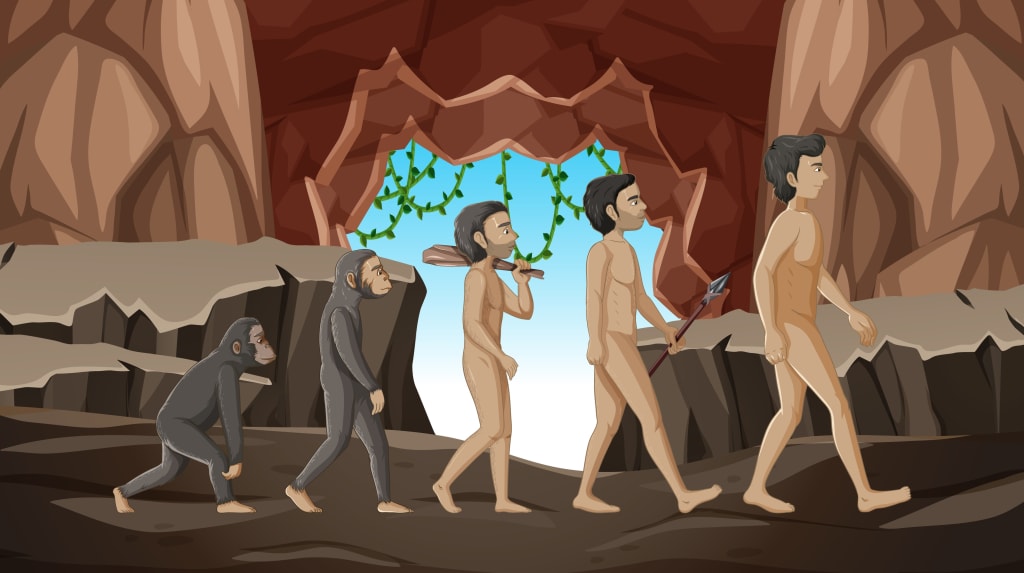Meat and the Mind: Unraveling the Evolutionary Connection between Meat Consumption and Human Brain Development
How MEAT shaped human evolution

The human brain is a complex and intricate organ that has evolved over millions of years. It is the seat of our thoughts, emotions, and actions, and has enabled us to conquer the world and reach unprecedented heights of success.
But have you ever wondered what fueled this evolutionary journey? What factors led to the growth and development of our brains, making them the powerful tools they are today? Surprisingly, the answer might be found in something as simple as the food we ate.
Specifically, the meat we consumed as early humans may have played a critical role in the evolution of our brains, shaping them into the powerful tools they are today. In this blog post, we will explore the significance of meat in early human brain development and examine how it contributed to the remarkable journey of our evolution.
Brief history of early human diet
Early humans were primarily hunter-gatherers who lived in small communities and relied on the environment for food. Their diet varied depending on where they lived and what resources were available, but it was generally composed of plant-based foods such as fruits, nuts, roots, and tubers.
However, as early humans began to evolve, their diet also began to change. Around 2.6 million years ago, they discovered the benefits of eating meat and started incorporating it into their diet. Initially, they scavenged the meat of animals that had already been killed by predators or natural causes. But as they became better at hunting, they began to actively hunt and kill animals for their meat.
Over time, early humans developed tools and techniques that made hunting and butchering animals easier. They also learned how to cook meat, which made it easier to digest and allowed them to extract more nutrients from it. As a result, meat became an increasingly important part of their diet, and it played a crucial role in the evolution of their brains and bodies.
The Importance of Meat in Early Human Diet
Meat played a crucial role in the early human diet, providing a rich source of nutrients that were essential for their growth and survival. Here are some of the reasons why meat was so important:
Protein and amino acids: Meat is a rich source of protein, which is essential for building and repairing tissues in the body. It contains all of the essential amino acids that the human body needs, making it a complete source of protein.
Fat and cholesterol: While many people today consider fat and cholesterol to be unhealthy, they were essential components of the early human diet. Fat provided a concentrated source of energy, while cholesterol was necessary for building and maintaining cell membranes.
Vitamins and minerals: Meat is a rich source of vitamins and minerals that are difficult to obtain from other foods. For example, it is one of the best sources of vitamin B12, which is essential for the development of the nervous system and the formation of red blood cells.
Comparison of meat-based and plant-based diets: While plant-based diets can provide many of the nutrients that the body needs, they are often deficient in certain nutrients that are abundant in meat. For example, plant-based diets are often low in vitamin B12, iron, and zinc.
Overall, meat provided early humans with a concentrated source of essential nutrients that were difficult to obtain from other foods. This made it an important part of their diet and played a critical role in their growth and development.
Brain Development in Early Humans
The evolution of the human brain is one of the most significant milestones in human history. Our brains are what make us unique, allowing us to think, reason, and communicate in ways that no other species can. But how did our brains evolve, and what role did diet play in this process? In this blog post, we will explore the fascinating topic of brain development in early humans.
Early Human Brain Evolution
The evolution of the human brain is a long and complex process that took millions of years to unfold. It began around 2.6 million years ago, when our early human ancestors started using tools and developed the ability to walk upright. Over time, their brains grew in size and complexity, and they developed new cognitive abilities such as language, abstract thinking, and problem-solving.
One of the most significant factors that contributed to this evolution was diet. Early humans were primarily hunter-gatherers who relied on the environment for food. Their diets consisted of a mix of plant-based foods such as fruits, nuts, roots, and tubers, as well as meat from animals that they hunted or scavenged. This combination of plant-based and animal-based foods provided early humans with a rich source of nutrients that were essential for brain development.
The Role of Meat in Brain Development
Meat played a crucial role in early human brain development. It provided a concentrated source of protein, fat, and other essential nutrients that were difficult to obtain from plant-based foods alone. These nutrients were essential for building and maintaining the brain, as well as supporting the growth and development of the body.
One of the most important nutrients found in meat is protein. Protein is essential for building and repairing tissues in the body, including the brain. It contains all of the essential amino acids that the body needs, making it a complete source of protein. Without enough protein in their diets, early humans would not have been able to build and maintain the complex neural connections that are necessary for cognitive abilities such as memory and learning.
Meat is also a rich source of fat and cholesterol. While these nutrients have a bad reputation today, they were essential components of the early human diet. Fat provided a concentrated source of energy, while cholesterol was necessary for building and maintaining cell membranes. These components played a crucial role in the development and function of the brain.
Vitamins and minerals found in meat were also essential for brain development. For example, meat is one of the best sources of vitamin B12, which is essential for the development of the nervous system and the formation of red blood cells. Meat is also a good source of iron and zinc, which are important for cognitive function and immune system health.
Meat and Brain Development
In the previous section, we discussed how meat played a crucial role in early human brain development. In this section, we will explore the connection between meat consumption and brain size, the role of long-chain polyunsaturated fatty acids (LC-PUFAs) in brain development, and studies supporting the link between meat consumption and brain development.
Connection between Meat Consumption and Brain Size
Research has shown that there is a connection between meat consumption and brain size. In a study published in the journal Nature, researchers found that early humans who consumed more animal-based foods had larger brains than those who relied more heavily on plant-based foods. The researchers suggested that the increase in brain size was due to the higher quality and quantity of nutrients found in animal-based foods, particularly meat.
Another study, published in the American Journal of Clinical Nutrition, found that pregnant women who consumed more meat had children with larger brains than those who consumed less meat. The researchers suggested that the increased intake of nutrients found in meat, particularly protein and iron, may have contributed to the larger brain size.
The Role of Long-Chain Polyunsaturated Fatty Acids (LC-PUFAs) in Brain Development
Long-chain polyunsaturated fatty acids (LC-PUFAs) are a type of fat that is essential for brain development. They are found in high concentrations in certain types of fish, such as salmon and sardines, as well as in meat and eggs.
Research has shown that LC-PUFAs, particularly docosahexaenoic acid (DHA), play a crucial role in the development and function of the brain. DHA is a major component of the brain and is necessary for the growth and maintenance of neural connections. It is also important for cognitive function, including memory and learning.
Studies Supporting the Link between Meat Consumption and Brain Development
Numerous studies have supported the link between meat consumption and brain development. In a study published in the journal Nutritional Neuroscience, researchers found that children who consumed more meat had higher cognitive scores than those who consumed less meat. The researchers suggested that the nutrients found in meat, particularly iron, zinc, and vitamin B12, may have contributed to the higher cognitive scores.
Another study, published in the journal Appetite, found that older adults who consumed more meat had better cognitive function than those who consumed less meat. The researchers suggested that the nutrients found in meat, particularly B vitamins and iron, may have played a role in maintaining cognitive function in older adults.
Challenges and Controversies
Despite the evidence supporting the link between meat consumption and brain development, there are challenges and controversies associated with the consumption of meat.
One challenge is the environmental impact of meat production. Livestock farming is a significant contributor to greenhouse gas emissions and land use. The production of meat requires a large amount of water, and the waste produced by livestock farming can pollute waterways and damage ecosystems.
Another challenge is the ethical concerns associated with the treatment of animals. The treatment of animals in industrial livestock farming can involve practices that are considered cruel, such as the use of cramped and unsanitary living conditions, and the use of hormones and antibiotics.
In addition to these challenges, there is controversy surrounding the health effects of meat consumption. Some studies have linked high meat consumption to an increased risk of heart disease, certain cancers, and other health issues. However, other studies have found no significant link between meat consumption and these health issues.
There is also a growing trend towards plant-based diets, which exclude or limit the consumption of meat and other animal products. Proponents of plant-based diets argue that they are healthier, more environmentally sustainable, and more ethical than meat-based diets.
However, some experts argue that plant-based diets may not provide all the necessary nutrients for optimal brain development and function, particularly in children and pregnant women. They suggest that including meat in a balanced diet can provide important nutrients, such as protein, iron, and LC-PUFAs, that are crucial for brain development.
In conclusion, the consumption of meat has played a crucial role in early human brain development, but there are challenges and controversies associated with its consumption. While plant-based diets may be a healthy and sustainable option for some individuals, including meat in a balanced diet can provide important nutrients for brain development and function. It is important to consider both the benefits and challenges associated with meat consumption when making dietary choices.
About the Creator
Dr.Anandharaj Ph.D.
Ph.D. in Biotechnology, writing health & mental-related blogs, #sciencewriter #healthblogger #mentalhealthadvocate






Comments
There are no comments for this story
Be the first to respond and start the conversation.